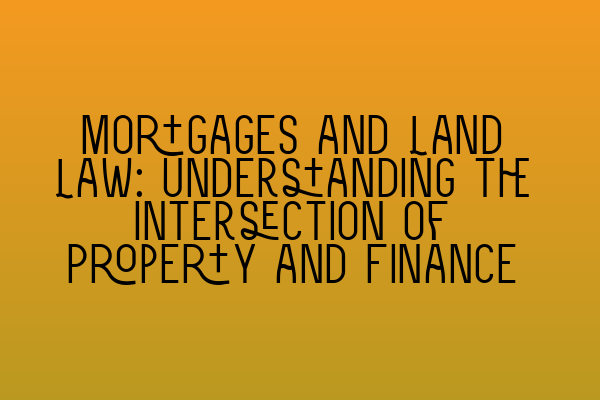Mortgages and Land Law: Understanding the Intersection of Property and Finance
When it comes to property law, mortgages play a vital role in the financing and ownership of real estate. Understanding the intersection of property and finance is crucial for solicitors practicing in the field of property law, as well as for individuals looking to navigate the complexities of buying or selling property.
In this article, we will delve into the key aspects of mortgages in land law, highlighting their significance and providing insight into the legal principles governing them. Whether you are a law student preparing for the SQE exams or a property owner seeking a deeper understanding of mortgages, this article aims to provide you with valuable information.
What is a Mortgage?
A mortgage is a legal agreement between a lender (usually a bank or building society) and a borrower (the property owner) that allows the borrower to obtain a loan to purchase or refinance a property. This loan is secured by the property itself, giving the lender the right to take possession of the property if the borrower fails to repay the loan.
The terms and conditions of a mortgage are typically outlined in a mortgage deed, which sets out the rights and obligations of both the lender and the borrower. It is important for both parties to carefully review and understand these terms before entering into a mortgage agreement.
Types of Mortgages
There are various types of mortgages available to property owners, each with its own features and benefits. Some common types of mortgages include:
- Repayment Mortgages: With a repayment mortgage, the borrower makes regular payments to the lender, reducing both the capital and interest owed over time. At the end of the mortgage term, the borrower owns the property outright.
- Interest-Only Mortgages: An interest-only mortgage requires the borrower to pay only the interest on the loan, with the capital amount remaining the same throughout the term. This type of mortgage requires a separate investment vehicle to be in place to repay the capital at the end of the term.
- Fixed-Rate Mortgages: A fixed-rate mortgage offers a set interest rate for a predetermined period, providing stability and predictability in monthly repayments. This type of mortgage may be ideal for borrowers who prefer a consistent payment schedule.
- Variable-Rate Mortgages: Variable-rate mortgages have interest rates that fluctuate over time, typically based on the Bank of England base rate or other market factors. Borrowers should be prepared for potential changes in their monthly repayments.
It is essential for property owners to carefully consider their financial circumstances and long-term goals when choosing the type of mortgage that best suits their needs.
Legal Principles Governing Mortgages in Land Law
In land law, several legal principles govern the creation, enforcement, and discharge of mortgages. The primary legal principles relevant to mortgages include the following:
- Equitable Principles: Equitable principles provide a framework for resolving disputes related to mortgages. These principles ensure fairness and balance between the rights of the lender and the borrower.
- Registration Requirements: Mortgages must be registered with the Land Registry to protect the lender’s interest in the property. Failure to register a mortgage properly may result in the loss of priority or even invalidation of the mortgage.
- Foreclosure: If a borrower defaults on their mortgage payments, the lender may have the right to take possession of the property through a legal process known as foreclosure. Foreclosure allows the lender to sell the property to recover the outstanding debt.
- Priority: The concept of priority determines the order in which multiple mortgages on a property are paid off. Generally, the first mortgage registered holds the highest priority, meaning it will be paid off before subsequent mortgages in the event of foreclosure.
These legal principles form the foundation of mortgage transactions and ensure clarity and fairness between the lender and the borrower.
Conclusion
Mortgages are a fundamental component of property law, blending elements of property and finance. Understanding the intricate intersection of mortgages and land law is essential for solicitors specializing in property law and individuals engaged in property transactions.
By comprehending the types of mortgages available, the legal principles governing their creation and enforcement, and the potential financial implications, both solicitors and property owners can navigate the complexities of mortgages with confidence.
To further enhance your understanding of property law and prepare for the SQE exams, consider exploring our related articles:
- SQE 1 Practice Exam Questions: https://fqps.co.uk/sqe/sqe1-preparation/mcq-practice-quiz
- SQE 1 Practice Mocks FLK1 FLK2: https://fqps.co.uk/sqe/sqe1-preparation/practice-mocks-quiz
- SQE 2 Preparation Courses: https://fqps.co.uk/sqe/sqe2-preparation
- SQE 1 Preparation Courses: https://fqps.co.uk/sqe/sqe1-preparation
- SRA SQE Exam Dates: https://fqps.co.uk/sqe/sqe1-sqe2-exam-dates
By leveraging these valuable resources, you can enhance your knowledge and preparation for success in the field of property law.
